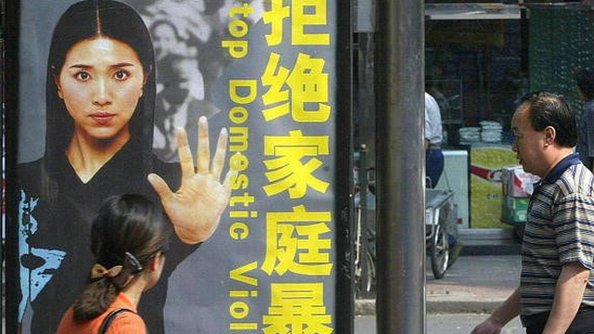After years of campaigning by women’s rights activists, the State Council has drafted the first law on domestic violence. Advocates for the law have long argued that women in abusive relationships have no legal recourse to protect themselves. BBC reports:
The new bill defines domestic violence for the first time and offers clear guidance on restraining orders.
Activists have welcomed the move but say the law does not go far enough.
Nearly 40% of Chinese women who are married or in a relationship have suffered abuse, according to state media.
Domestic abuse has long been seen as a private matter in China despite the scale of the problem, says the BBC’s Martin Patience in Beijing. [Source]
Some people believe the law doesn’t go far enough because it only covers married couples, not those living together but unmarried or homosexual couples. Emily Rauhala at Time Magazine discusses the case of Kim Lee, who escaped an abusive marriage to celebrity English teacher Li Yang and since then has campaigned in China for greater protections against domestic violence:
This week’s draft measures could, potentially, help in similar cases. The All-China Women’s Federation estimates that 1 in 4 Chinese women has experienced domestic abuse. (Estimates from other countries are even higher.) If China pushes ahead with the legislation, makes it comprehensive, and strengthens enforcement, the police and courts would be better equipped to take action. The draft suggests that people could seek physical protection from attackers — a restraining order, for instance — a detail that Feng Yuan, founder of Equality, a Beijing-based NGO dedicated to the protection of women’s rights, called “very encouraging.”
But there are gaps. The draft mentions children, which is a good step, but does not include provisions or protections for nonmarried couples (including same-sex couples, who are not legally allowed to marry in China). And how will police officers and courts be trained to interpret and enforce the law? “There are a lot of good laws on the books in terms of rights protection in China,” says [Leta] Hong Fincher, “yet those laws are not enforced.” She points to countries like India and Bangladesh. Both have decent anti-domestic-violence laws, but have made limited progress curbing abuse. [Source]
The draft law is now available online and the public is invited to comment on it. China Law Translate has translated the full text of the draft as well as the accompanying explanation.
Read more about Kim Lee’s case and about domestic violence in China, via CDT.








